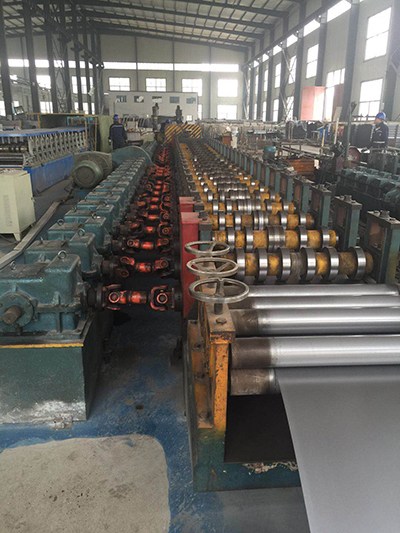After taking the drawings, choose different blanking methods according to the different drawings and batches that are unfolded, including laser, CNC punching, cutting, molds, etc., and then expand accordingly according to the drawings. CNC punch presses are affected by tools. For some special-shaped workpieces and irregular sheet metal holes, large burrs will appear on the edges. Subsequent deburring treatment affects the accuracy of the workpiece to a certain extent; laser processing has no tool restrictions, and the cross-section is flat, suitable for processing special-shaped workpieces, but it takes a long time to process small workpieces. Place the worktable next to the CNC and the laser, which is conducive to placing the boards on the machine for processing and reducing the workload of lifting the boards. Place some available side materials in designated locations to provide material for the trial mold during the bending process. After the workpiece is blanked, the corners, burrs and joints should be trimmed as needed (grinding treatment). Tool contacts should be trimmed with a flat file. For workpieces with larger burrs, please use a grinder for trimming, and smaller inner hole contacts should be trimmed with corresponding small files to ensure beautiful appearance. At the same time, the shape trimming also ensures the positioning during bending, so that the position of the workpiece on the bending machine during bending is consistent, and the size of the same batch of products is consistent.

After blanking is completed, enter the next process, and different workpieces enter the corresponding process according to the processing requirements. There are differences in bending, riveting, flanging tapping, spot welding, convex hull and segmentation. Sometimes, the nut or stud should be pressed after bending one or two times. Among them, the convex hull and segmentation differences of the mold should be considered. Process first to avoid interfering with other processes after the first process, and the required process cannot be completed. When there are hooks on the upper cover or the lower shell, if touch welding cannot be performed after bending, handle it before bending.
When bending, first determine the tools and slots for bending according to the dimensions on the drawing and the thickness of the material. Avoiding the deformation caused by the collision between the product and the tool is the key to choosing the upper mold (in the same product, different types of upper molds may be used), and the choice of the lower mold is determined according to the thickness of the mold. The second is to determine the order of bending. The general rule of bending is first on the inside and then on the outside, first small then large, first special, then general. First, bend the workpiece with dead angle to 30°-40°, and then press it to death with a straightening die.
When riveting, please consider the height of the stud, select the same mold, and then adjust the pressure of the press to ensure that the surface of the stud is flush with the surface of the workpiece, and to avoid accumulation of the stud that is not firmly pressed into or out of the surface of the workpiece. Cause the artifact to be scrapped.
Welding includes argon arc welding, spot welding, carbon dioxide arc welding, manual arc welding and so on. Spot welding first considers the position of the workpiece to be welded, and considers making positioning fixtures to ensure the accuracy of the spot welding position during mass production.

Scan mobile station
Jinan Ruifu Mechanical Engineering Co., Ltd.
 Address: No. 686, Songzhuang Industrial Park, Huaiyin Section Store, Jinan City, Shandong Province
Address: No. 686, Songzhuang Industrial Park, Huaiyin Section Store, Jinan City, Shandong Province
 Phone: 0531-87512892/87518718
Phone: 0531-87512892/87518718
 Email: tong1203@163.com
Email: tong1203@163.com